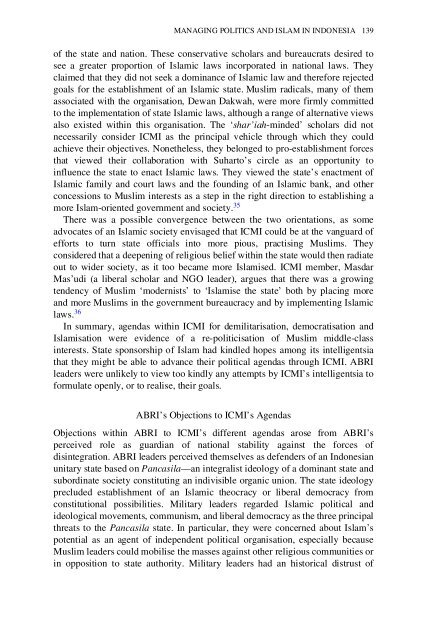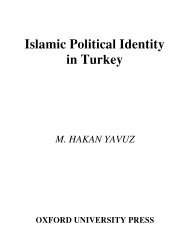You also want an ePaper? Increase the reach of your titles
YUMPU automatically turns print PDFs into web optimized ePapers that Google loves.
MANAGING POLITICS AND ISLAM IN INDONESIA 139of the state <strong>and</strong> nation. These conservative scholars <strong>and</strong> bureaucrats desired tosee a greater proportion of <strong>Islam</strong>ic laws <strong>in</strong>corporated <strong>in</strong> national laws. Theyclaimed that they did not seek a dom<strong>in</strong>ance of <strong>Islam</strong>ic law <strong>and</strong> therefore rejectedgoals for the establishment of an <strong>Islam</strong>ic state. Muslim radicals, many of themassociated with the organisation, Dewan Dakwah, were more firmly committedto the implementation of state <strong>Islam</strong>ic laws, although a range of alternative viewsalso existed with<strong>in</strong> this organisation. The ‘shar’iah-m<strong>in</strong>ded’ scholars did notnecessarily consider ICMI as the pr<strong>in</strong>cipal vehicle through which they couldachieve their objectives. Nonetheless, they belonged to pro-establishment forcesthat viewed their collaboration with Suharto’s circle as an opportunity to<strong>in</strong>fluence the state to enact <strong>Islam</strong>ic laws. They viewed the state’s enactment of<strong>Islam</strong>ic family <strong>and</strong> court laws <strong>and</strong> the found<strong>in</strong>g of an <strong>Islam</strong>ic bank, <strong>and</strong> otherconcessions to Muslim <strong>in</strong>terests as a step <strong>in</strong> the right direction to establish<strong>in</strong>g amore <strong>Islam</strong>-oriented government <strong>and</strong> society. 35There was a possible convergence between the two orientations, as someadvocates of an <strong>Islam</strong>ic society envisaged that ICMI could be at the vanguard ofefforts to turn state officials <strong>in</strong>to more pious, practis<strong>in</strong>g Muslims. Theyconsidered that a deepen<strong>in</strong>g of religious belief with<strong>in</strong> the state would then radiateout to wider society, as it too became more <strong>Islam</strong>ised. ICMI member, MasdarMas’udi (a liberal scholar <strong>and</strong> NGO leader), argues that there was a grow<strong>in</strong>gtendency of Muslim ‘modernists’ to ‘<strong>Islam</strong>ise the state’ both by plac<strong>in</strong>g more<strong>and</strong> more Muslims <strong>in</strong> the government bureaucracy <strong>and</strong> by implement<strong>in</strong>g <strong>Islam</strong>iclaws. 36In summary, agendas with<strong>in</strong> ICMI for demilitarisation, democratisation <strong>and</strong><strong>Islam</strong>isation were evidence of a re-politicisation of Muslim middle-class<strong>in</strong>terests. State sponsorship of <strong>Islam</strong> had k<strong>in</strong>dled hopes among its <strong>in</strong>telligentsiathat they might be able to advance their political agendas through ICMI. ABRIleaders were unlikely to view too k<strong>in</strong>dly any attempts by ICMI’s <strong>in</strong>telligentsia toformulate openly, or to realise, their goals.ABRI’s Objections to ICMI’s AgendasObjections with<strong>in</strong> ABRI to ICMI’s different agendas arose from ABRI’sperceived role as guardian of national stability aga<strong>in</strong>st the forces ofdis<strong>in</strong>tegration. ABRI leaders perceived themselves as defenders of an <strong>Indonesia</strong>nunitary state based on Pancasila—an <strong>in</strong>tegralist ideology of a dom<strong>in</strong>ant state <strong>and</strong>subord<strong>in</strong>ate society constitut<strong>in</strong>g an <strong>in</strong>divisible organic union. The state ideologyprecluded establishment of an <strong>Islam</strong>ic theocracy or liberal democracy fromconstitutional possibilities. Military leaders regarded <strong>Islam</strong>ic political <strong>and</strong>ideological movements, communism, <strong>and</strong> liberal democracy as the three pr<strong>in</strong>cipalthreats to the Pancasila state. In particular, they were concerned about <strong>Islam</strong>’spotential as an agent of <strong>in</strong>dependent political organisation, especially becauseMuslim leaders could mobilise the masses aga<strong>in</strong>st other religious communities or<strong>in</strong> opposition to state authority. Military leaders had an historical distrust of




